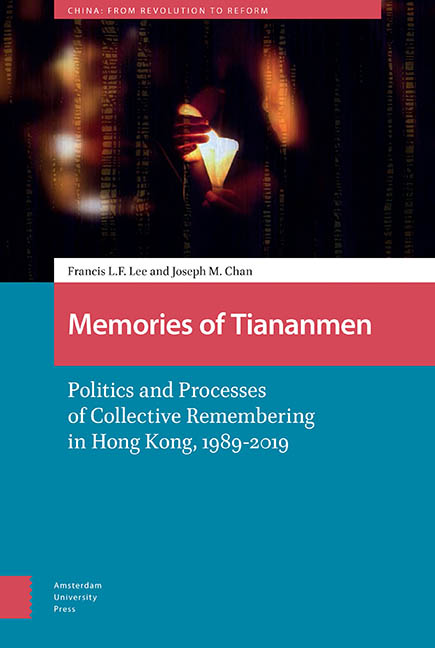Book contents
- Frontmatter
- Contents
- List of Figures and Tables
- Acknowledgments
- List of Abbreviations
- 1 Introduction
- 2 Memory Formation and the Valorization of Commemoration
- 3 Memory Mobilization
- 4 Intergenerational Memory Transmission
- 5 The Struggle for Memory Institutionalization
- 6 The Challenge of Localism and Memory Repair
- 7 Changing Attitudes toward Tiananmen?
- 8 Digital Media and Memory Balkanization
- 9 Conclusion
- Epilogue
- Appendix
- References
- Index
5 - The Struggle for Memory Institutionalization
Published online by Cambridge University Press: 16 July 2022
- Frontmatter
- Contents
- List of Figures and Tables
- Acknowledgments
- List of Abbreviations
- 1 Introduction
- 2 Memory Formation and the Valorization of Commemoration
- 3 Memory Mobilization
- 4 Intergenerational Memory Transmission
- 5 The Struggle for Memory Institutionalization
- 6 The Challenge of Localism and Memory Repair
- 7 Changing Attitudes toward Tiananmen?
- 8 Digital Media and Memory Balkanization
- 9 Conclusion
- Epilogue
- Appendix
- References
- Index
Summary
Abstract
Chapter 5 discusses the struggle for memory institutionalization. Given the role of schools in intergenerational memory transmission, part of the empirical analysis focuses on the controversies surrounding the place of June 4 in the secondary school curriculum. Besides, the chapter examines efforts by the Alliance and other activist groups to establish enduring “sites of memory” for Tiananmen. Specifically, the struggles surrounding the placement of June 4-related monuments on university campuses and the project of a permanent June 4th Museum are examined.
Keywords: memory institutionalization, the educational institutions, sites of memories, June 4th Museum
The transmission of collective memory from one generation to the next can be achieved through informal and interpersonal mechanisms. As illustrated in the previous chapter, some young people in Hong Kong became interested in the Tiananmen Incident through an emotional sharing by their teachers. Some of the teachers talked about June 4 in their classes even though the Tiananmen Incident was not pertinent to the subjects they taught. Having the teachers venturing outside of the school curriculum may signal the specialness of the topic and may therefore help arouse students’ interests. But in the long run, it can be difficult for memory transmission to be sustained if it remains entirely reliant on such informal mechanisms. As suggested toward the end of the last chapter, when a generation of teachers left their position, they also took their memories of Tiananmen away. The situation could be different if the discussion of the Tiananmen Incident can become a regularized part of the curriculum or the school calendar. It could ensure that students will learn about the event no matter who the teacher is.
Beyond the context of secondary school education, the broader issue here is memory institutionalization, by which we mean the inscription of collective memory into enduring institutional forms such that the collective memory gains a permanent presence in specific arenas in the society. This can be achieved through the inscription of collective memory into existing institutions or through the establishment of institutions devoted to collective remembering of an event.
- Type
- Chapter
- Information
- Memories of TiananmenPolitics and Processes of Collective Remembering in Hong Kong, 1989–2019, pp. 155 - 186Publisher: Amsterdam University PressPrint publication year: 2021



